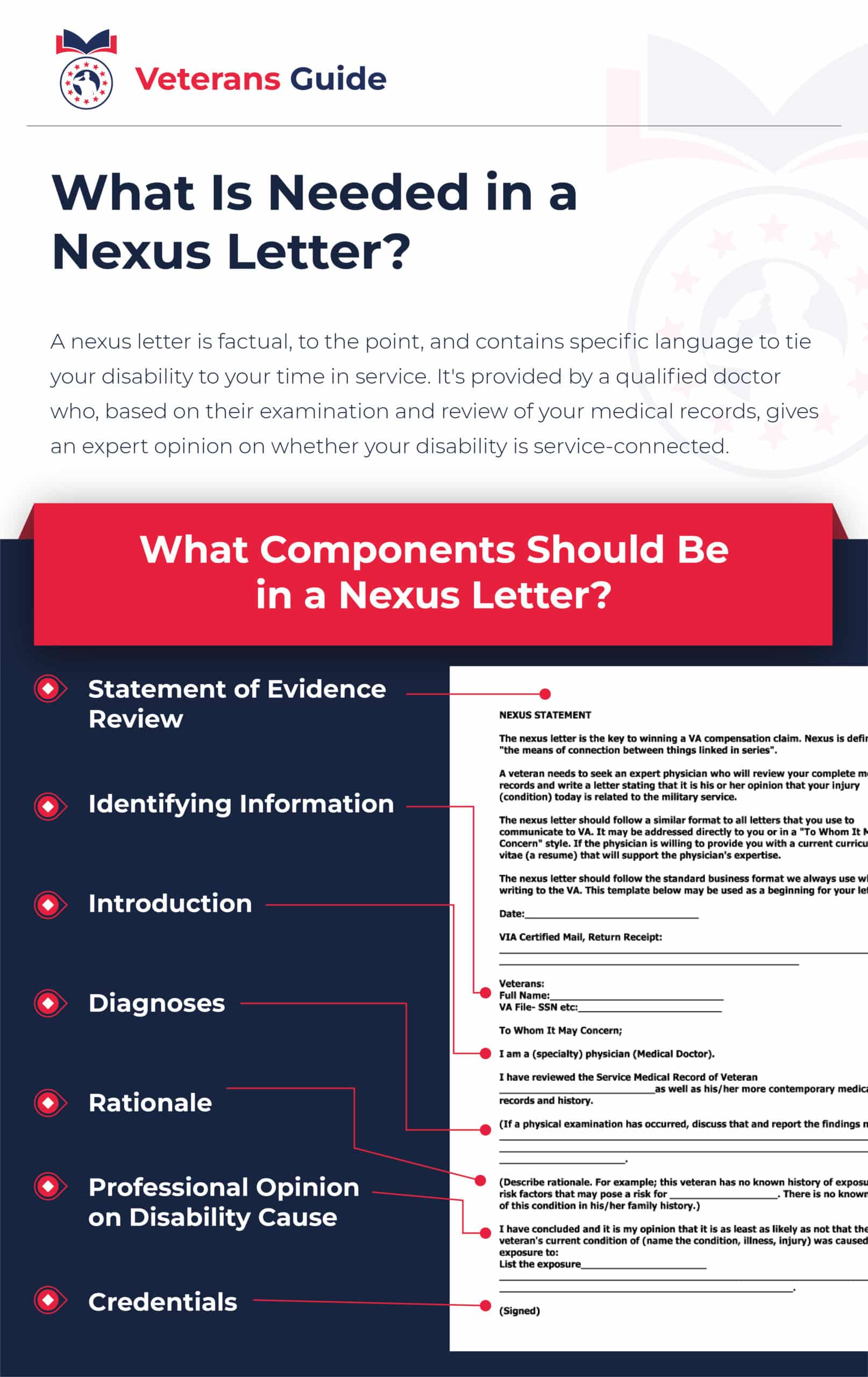
When preparing to file a claim for VA disability benefits, you may come across the term “nexus letter.” What is a nexus letter? A nexus letter is a formal medical opinion from a qualified doctor establishing a connection between your disability and your military service.
Key TakeawaysSubmitting a nexus letter with your VA disability claim often enhances your chances of approval. In fact, not including one is more likely to result in a denial. Veterans Guide explains the importance of a nexus letter and when it’s necessary to get one.
First things first: No rule requires you to submit a nexus letter with your VA disability benefits application.
However, the VA states that most denials result when no nexus letter is submitted, or the nexus letter is inadequate. In other words, failing to submit a nexus letter reduces your chances of claim approval.
A nexus letter may not be necessary in the following situations:
Otherwise, you will likely need a nexus letter. A nexus letter is crucial to establish a service connection, especially if you didn’t receive a diagnosis until after your military service.
You should also include a nexus letter if you file a secondary service-connected claim. For instance, you may already have a disability approved by the VA and develop a new condition that directly relates to your original disability. Including a nexus letter with your claim for the secondary condition can help you tie the old disability to the new one. If the VA approves your claim, you may receive additional VA disability compensation, depending on your disability rating.
If the VA denies your disability claim, you may decide to appeal. If you do, you must submit sufficient evidence to persuade the VA to change its opinion. A nexus letter can support your case.
A nexus letter is factual, to the point, and contains specific language to tie your disability to your time in service. It’s provided by a qualified doctor who, based on their examination and review of your medical records, gives an expert opinion on whether your disability is service-connected.
The doctor provides their opinion based on evidence, typically including your military service medical files, other existing medical records, and a physical exam. The doctor may supplement their opinion with data or facts from medical journals or literature.

A properly written nexus letter includes the following elements.
The nexus letter should begin by listing the date, the veteran’s name, and Social Security number. If the veteran has a VA file number, it should also be included. Identifying information helps the VA tie the nexus letter back to your claim.
The introduction notes the doctor’s name and their specialty. It states that they are a board-certified medical doctor and describes the letter’s purpose—to provide their medical opinion on your disability and whether it’s service-related.
Next, the doctor describes the evidence reviewed that forms the basis of their opinion. Evidence may include the veteran’s service records and medical records. If a specific incident led to your disability, the doctor may describe the event and the date it occurred.
The doctor will provide a diagnosis of the disability. The diagnosis is the type of medical condition you’re suffering from. The doctor may also indicate whether they’ve conducted a physical exam or other tests, such as lab work or X-rays.
The doctor’s professional opinion is the most crucial part of the nexus letter. The letter should state the doctor’s opinion regarding the likelihood that your disability is service-connected. The doctor must choose a degree of likelihood from three choices: “At least as likely as not,” “More than likely,” or “Highly likely.”
The strongest likelihood is “Highly likely,” but “as least as likely as not” is still considered favorable to the veteran.
Following the professional opinion, the doctor provides a supporting rationale to justify their assessment. The rationale can be based on personal experience, medical literature, or medical journals.
The doctor’s credentials include their specialty. If they’re a VA doctor, they will include their VA title.
The person who writes your nexus letter must be an expert—a licensed medical doctor. The VA won’t consider a nexus letter written by someone without a medical background.
It’s important to seek a nexus letter from a doctor specializing in your disability. For instance, if you have a bone injury, you’ll want a nexus letter from an orthopedic surgeon. If you have PTSD, request a nexus letter from a clinical psychiatrist or psychologist. A doctor with knowledge specific to your disability will give your nexus letter additional credibility.
Here is an example of a nexus letter that contains all the appropriate elements.
DATE _________________
Reference: (Veteran’s name) _________
SS# ________ VA File # _______________
To Whom It May Concern,
I am Dr. _________. I am board-certified in my specialty. My credentials are included. I have been asked to write a statement in support of the aforementioned Veteran’s disability claim.
I have personally reviewed their medical history. (Name the Documents) I have also reviewed and noted the circumstances and events of their military service in the years ____________ (Event or Events claims as the cause of the condition) while they served during their military service. (List dates of service)
Mr/Ms/Mrs. ________ has been a patient under my care since (enter date). Their diagnosis is ___________ (Name the Condition).
I am familiar with their history and have examined Mr/Ms/Mrs. ________ often while they were under my care. (Specify Lab Work, X-rays, Etc.)
Mr/Ms/MRS. ________ has no other known risk factors that may have precipitated their current condition.
After a review of the pertinent records, it is my professional opinion that it is at least as likely as not that Mr/Ms/Mrs. ________’s condition is a direct result of their (Event) as due to their military service.
Based on my personal experience and the medical literature, it is known (Provide a rationale).